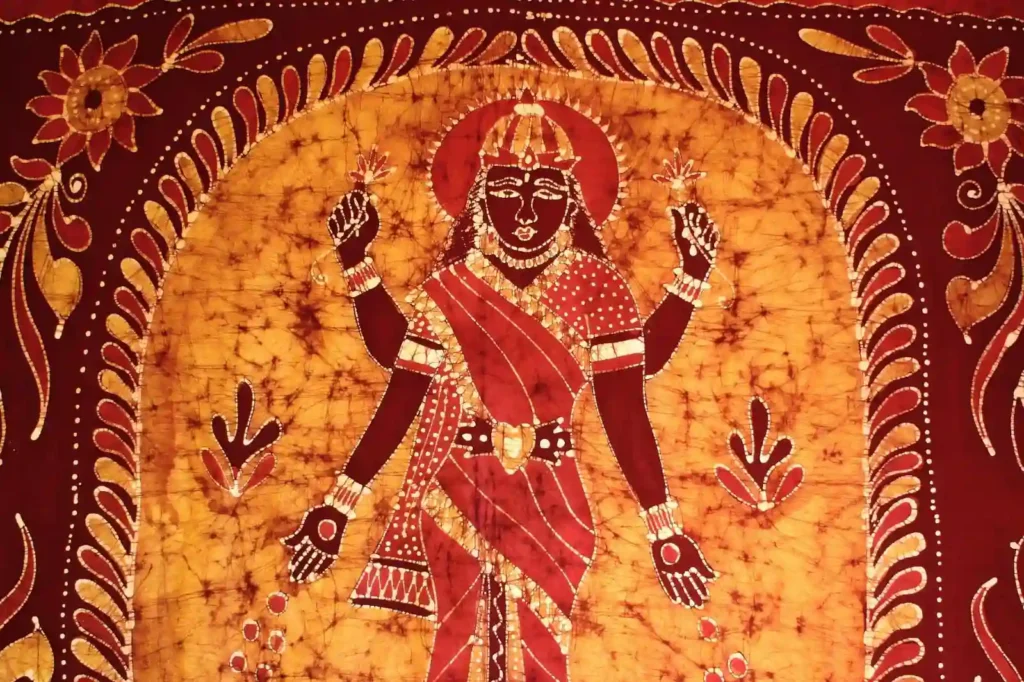
Table of Contents
In most Indian households, Lakshmi is often worshipped as the goddess of wealth and prosperity. However, in the heart of Odisha—particularly in the Jagannath Temple of Puri—Lakshmi represents far more than just affluence. Indeed, she emerges as a voice of compassion, rebellion, and divine justice.
Moreover, one of the most powerful portrayals of Lakshmi comes from the Lakshmi Purana—a poetic text that, in fact, doesn’t merely tell a story but boldly challenges deep-rooted societal norms like caste discrimination and patriarchy. Therefore, through this blog, let’s journey into the heart of this lesser-known but deeply inspiring narrative.The Lakshmi Purana – A Story of Strength and Devotion
Narrating the Divine Journey of the Goddess Who Refused to Stay Silent
Written by Balaram Das, the Lakshmi Purana narrates how Goddess she once stepped out of the Jagannath Temple during Manabasa Gurubara (Thursdays of the Margashira month). In fact, she did so to witness how her devotees performed her rituals.
Then, she came across Sriya, a woman from the Chandala (lower) caste, who was conducting the puja with sincere devotion—cleaning her home with cow-dung water, drawing intricate Jhoti with rice flour, and offering prayers with a pure heart. Indeed, Lakshmi felt impressed and blessed her with cows, prosperity, children, and a happy life—everything except immortality.The Wrath of Patriarchy – Lakshmi Faces Rejection
When the Goddess Was Punished for Breaking Caste Norms
To begin with, Balabhadra, Lord Jagannath’s elder brother, disapproved of her visit to a so-called untouchable’s house. Consequently, he ordered the temple guards to block the goddess from re-entering the temple.
- First, the temple authorities insulted her in front of the servitors.
- Next, they stripped her divine robes in an act of humiliation.
- Then, the Lords scolded her father publicly for her actions.
- Finally, they ignored her pleas for justice and dignity.
The Goddess Fights Back – Taking Away Everything

How Lakshmi Proved Her Importance to the Lords Themselves
- Sent vetalas to steal the temple’s food and treasure from the Ratna Bhandar
- Ordered the Goddess of Sleep to lull the Lords
- Asked Saraswati to stop people from offering food to the brothers
Realization, Reconciliation, and Return
Lakshmi’s Lesson in Humility and Feminine Power
Desperate and hungry, the brothers begged for food, only to be turned away repeatedly. Finally, they stumbled upon a palace—Lakshmi’s palace.
Disguised as a Chandaluni’s home, they were made to experience the same social humiliation Lakshmi once faced. Eventually, they realized her value.
- The brothers agreed to eat from a lower-caste woman
- They recognized the taste and essence of Lakshmi in the food
- Finally, Balaram asked Jagannath to bring her back
- Lakshmi reunited with them, restoring balance and prosperity to the temple
People Also Ask
Q1: What is Lakshmi Purana and why is it significant?
Q2: What is Manabasa Gurubara?
Q3: How does the goddess maintain her bond with Jagannath Temple?
Q4: What is the moral of Lakshmi Purana?
Q5: Can anyone worship Goddess Lakshmi regardless of caste?
Lakshmi’s Living Legacy in Jagannath Traditions
A Living Symbol of Compassion and Empowerment
Indeed, today, Goddess Lakshmi is not just a deity of wealth—she’s a symbol of social reform in Odisha. Moreover, her temple within the Jagannath complex serves as a strong reminder that:
- Firstly, caste has no place in devotion
- Secondly, women hold divine power
- Thirdly, compassion and fairness are divine virtues
Final Thoughts
Lakshmi’s story in the Lakshmi Purana shows that divinity doesn’t conform—it reforms. She stood against discrimination, demanded respect, and redefined devotion. Her teachings are timeless—especially today, when the world needs reminders of equality, humility, and inner strength.
Let us remember her not just as the goddess of gold and grains, but as the goddess of justice and wisdom.Be Inspired by Lakshmi’s Wisdom
Have you ever read the Lakshmi Purana or observed Manabasa Gurubara? Share your thoughts and experiences with us.
Want to learn more about Odisha’s spiritual treasures? Follow us for deep dives into temple traditions, forgotten legends, and inspiring goddesses.
Let’s spread Lakshmi’s message—devotion has no caste, and divinity honors humility.
Jai Jagannath! Jai Mahalaxmi!


